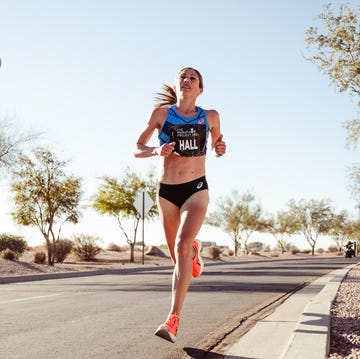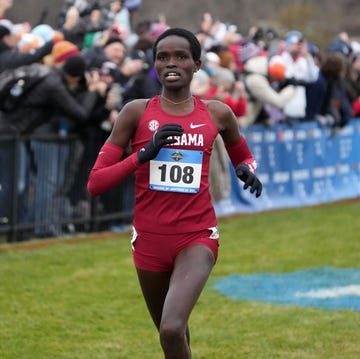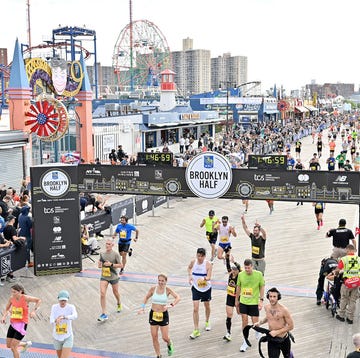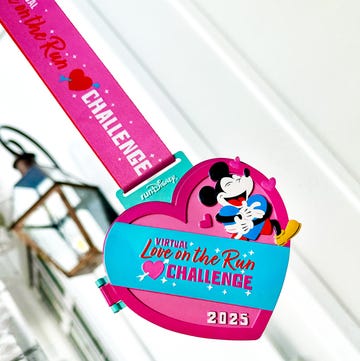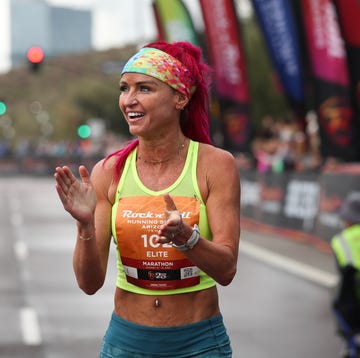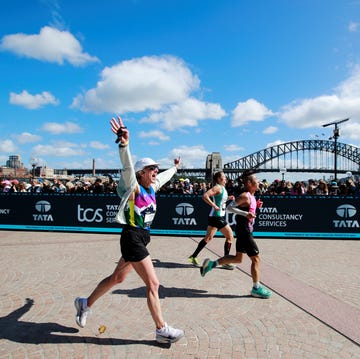Meb Keflezighi, the 2004 Athens Olympic marathon silver medalist (2:11:29) and 2004 ING New York City Marathon runnerup (2:09:53), will return to the New York City Marathon on November 6. Keflezighi was a close second to Abdi Abdirahman in the 10,000 at the 2005 USA Championships and then dropped out of the World Championships 10,000 in Helsinki with a leg injury. Keflezighi, 30, holds the American 10,000 record of 27:13.98 and was the U.S. Olympic Trials 10,000 champ in 2000 and 2004. In May, he was third in the Healthy Kidney 10K in New York behind Craig Mottram and Hendrick Ramaala. He currently resides in Mammoth Lakes, CA. Keflezighi won four NCAA cross country and track titles while at UCLA, where he was coached by Bob Larsen, who is still his mentor. On Monday, he was in New York attending U.S. Open tennis before going to Florida to visit his fiancée, Yordanos Asgedom, who was born in Eritrea but has been in the U.S. for more than 20 years.
Runner's World Daily: Nutrition - Weight Loss?
Meb Keflezighi: Oh yeah, I love tennis. It's one of my favorites to watch--how quick they move, and how they read what the other guy or gal is going to do, and how they respond. And they have to be out there for a long time, too. I learned about the sport in PE class and played a few times and enjoyed it. I've been wanting to go out there (to the U.S. Open) for a long time, and today's the day.
RWD: How to Watch the NCAA XC Championships?
MK: On the men's side, Agassi's the guy. I've watched him for a very, very long time. He's doing a good job.
RWD: Let's get to your running. Are you ailing at the moment? You were planning to run the 10,000 in Brussels and decided not to do it.
MK: Yeah. The reason behind it is I have a partial rupture of my rectus femoris muscle on my side of my quad. I did an MRI on it and there's definitely a partial tear, not a complete tear. The doctor did an analysis and thought it wasn't so bad. From the symptoms that he analyzed physically, he didn't think there was any damage. But when he did the MRI, he saw the partial tear. Today, it's three weeks since I got the injury. On Friday, I did 35 minutes of aqua jogging and then I did 20 minutes on the bike, which uses a lot of the quad and didn't bother it. It's coming along. I definitely had to postpone my Brussels race, where I was looking forward to doing some great things. The same thing with Helsinki. I was hoping for that to be my race breakthrough in the 10k.
RWD: Is there a prognosis about when you can really start running?
MK: It happened probably just a little tiny bit in one of my workouts. But it was fine. We nursed it. And then during the race, it cramped up. I had a big cramp. I think that's when the rupture was. It wasn't before Helsinki, it was during the race.
RWD: What does Kenenisa Bekele's world record in Brussels do to your impressions of him?
MK: My brother called me yesterday and told me he (Bekele) broke a record. It's 26:17. That's 13:08 and change (for 5000) and then 13:08 again. That's impressive.
RWD: Results: 2024 NCAA DI Cross-Country Championships?
MK: I did a treadmill run, 15 minutes on a treadmill. It didn't bother me. Two or three days after I had the cramp in Helsinki, one doctor said I could jog easy, without intensity. The other doctor said three weeks, no running. We wanted to have a second opinion. It's coming along. When I'm injured, I'm like "wow," I couldn't even stretch or anything. I've come along way. One of my strengths is to recover fast. So hopefully, I can recover and get some training under my belt before November 6.
RWD: Are you confident you'll be able to show up at the New York City Marathon on November 6 in quite good shape?
MK: Yeah, I'm pretty confident of that. Just make progress. I have to make sure not to have a setback. There's plenty of time.
RWD: You accomplished so much in 2004, which led many New Yorkers to think about finally having an American win at the ING New York City Marathon. They know how much that would mean to the race, to American running, and to you personally. Getting a victory in the New York City marathon must be one of the major goals you have left.
MK: Yeah. I'll give it a shot, definitely. A couple of times, I did that here. The first here, in 2002, I really thought I could hook up with the frontrunners (he challenged eventual winner Rodgers Rop on First Avenue in Manhattan). I made a few mistakes, but I learned a lot, and I'm glad I did it. If I don't try, I won't know. I'm just thankful to do what I do on a day-to-day basis. Since then, it's been one of my goals to win the New York City Marathon. It is one of my dreams to accomplish, and I think it would change a lot for me personally and also for distance running in the U.S.A. We had Alan (Culpepper) do well in Boston (he was fourth in April), which is a step in the right direction. We can't forget Deena Kastor. We just have to put it together. Some things you can control, some things you can't. We just work hard, and get ready to go on those days, and hopefully we'll come through.
RWD: Did you get to talk to the American marathoners in Helsinki and were you impressed by what Brian Sell did, his ninth place in 2:13:27 at the Worlds?
MK: Yeah. Ever since the Olympic Trials, I was very impressed. He was on his own terms and kind of went early (Sell was the early leader before finishing 13th), But he's a capable athlete. He finished ninth, in almost a PR. It's huge in the conditions that he ran in. I was very impressed by what he did.
I remember I was a host for Peter Gilmore (who had a subpar 2:25:17 for 51st in Helsinki) when he was deciding between Cal (Berkeley) and UCLA. I was his host on his recruiting trip. He and Coach Bob Larsen's son went to school together, and we were trying to get him to UCLA. We set down and chatted and talked about training and whatnot. We all learn from each other. You see a lot of development going from high school to college and post-college, professionally, and that's because people are sharing info and saying "hey let's get together for a run" and saying "what kind of training are you doing?" Then you share ideas. You can't do it all, but be wise and use all that information and make your own decisions that make you a better athlete and a better human being.
RWD: Well, hopefully, you'll heal yourself quickly.
MK: I hope so, too. I didn't bring my running shoes this trip (to New York). I'm just enjoying this trip and getting healthy. For the first time in 15 years, it feels a little awkward not to have training shoes or running shoes.

